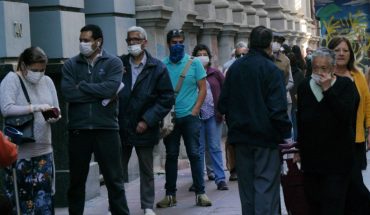
The current pandemic is likely to bring about changes in our lifestyles and in our increasingly digital way of socializing. We know that great catastrophes have been catalyst elements of transformations of social reality. Thus, for example, the bubonic plague helped eradicate the feudal system in Europe and the Great Depression of 29′ contributed to a radical shift between state-market relations. Based on this, different intellectuals have suggested that the current pandemic crisis could bring with it a transformative dimension that undertoose our current cosmopolitan-liberal life model and our systems of economic-capitalist relations, such as social and international ones.
Some think that the current viral crisis is an indication of a crisis of our civilization or the death of a cultural paradigm. This would give rise to transformations of our capitalist and liberal-cosmopolitan system based on individual freedoms. It is here, in this cultural interpretation of the pandemic, that its greatest long-term risk to our civilization and progress underlies. The main danger, outside the biological aspect, is intellectual and cultural, in that the pandemic is read as an indication that we have come to the end of a form of civilization and that it should therefore be radically transformed.
The great threat of the virus to our civilisational-liberal processes is then, as Carlos Peña suggested, the “intellectual dimension of the plague”. Since it has opportunistically argued that it is precisely the globalized capitalist model, based on individualism and private property, one of the most aggravating pernicious elements of this biological crisis. Thus, an intellectual management (or dimension) of this viral crisis can be glimpsed— and with a degree of Manicheanism, which focuses on two great criticisms and threats with a transformative, and perhaps destructive, vision for our model of civilization.
First, there is a transformative threat to cosmopolitan capitalist processes based on individual freedom. It has been suggested that this crisis shows that there is no need to live either cosmopolitan-individualistically, nor maintaining our current forms of international production, which have been exacerbated by liberal capitalism. It is argued that capitalism and globalization have exacerbated our feelings of competitiveness and selfishness, eroding our feelings of community and solidarity, making it more difficult to combat the pandemic. But these arguments, apart from being mere commonplaces and phrases made, are very unconvincing.
It is necessary to recognize that it has been thanks to our current capitalist and individualistic models of life that individuals today have greater spaces and better material conditions per square meter in order to face widespread isolation. The tragic case of contagion in India and the buenos aires periphery—where people live overcrowded, but in community—is a paradigmatic of the opposite condition. In fact, it is thanks to our individualistic styles of life and capitalism, which generates destructive creation, that today we can maintain private quarantines, physically moving away from the rest, but still maintaining our social, economic and collective bonds, all without having to give up our “bourgeois” quality of life. The comfortable way people are now facing the pandemic—sitting in their armchairs watching Netflix and doing social meetings on Zoom—is far from how other (non-capitalist) systems have dealt with pandemics.
Most likely, those very critics of capitalism will be the first to celebrate science and scientists—working in private companies—when they find a commercially viable cure for COVID-19; without recognizing, in turn, the relevance of the globalizing and capitalist context that can make such a cure not only possible, but also economically accessible to all. No one will subsequently criticize either globalization or individualistic profit when private companies use aircraft, patents and capitalist technology to economically distribute and commercialize the cure of the virus throughout the orb.
Second, there is a threat to Western democratic systems of government, based on liberal democracies and the defenses of individual sovereignty (citizen empowerment). It is argued that the governments that have been able to respond best to the crisis have been those Asians based on authoritarian-police and digital surveillance systems; where individual freedoms— particularly digital, expression and mobility freedoms, are restricted and constantly monitored. Thus, it will seek to misleadingly publicize those systems of organization of police-digital state, which are more controlling and authoritarian, as the only ones capable of successfully responding to these types of crises and safeguarding our biological lives.
This is one of the main transformative risks of COVID-19: that the belief, exacerbated by fear and panic, that it is necessary to abandon the individualistic principles of the liberal democracies of the West so that the digital-omnipresent state can protect us from future natural tragedies and that, finally, we begin to look with good eyes at those anti-liberal systems of Asian governments. This panic of the pandemic can make us forget the history of the twentieth century and the fact that the abandonment of democratic principles and freedoms can be far more pernicious than any plague.
There is a risk then that the pandemic will generate a more favourable view of the population towards these totalitarian surveillance systems, opening up the possibility to a new type of “digital Faustian negotiation”, in which citizens give greater degrees of freedom and privacy to the State, obtaining in return an alleged protection (subcutaneous surveillance) of this against possible pandemics. However, this intention to renounce virtuous individualism and seek to embrace police and totalitarian systems of organization to stop pandemics does not recognize the historical fact that authoritarian and collectivist political systems have been the main carriers of pests and disasters.
Humanity, in fact, owes more catastrophes and suffering to anti-individualistic ideologies and collectivistic utopias than to biological pests. Collectivist delusions and anti-individualistic utopias have been the worst man-made plagues in the 20th century. Long-term humanitarian costs and damages, associated with embracing authoritarian-police systems, can be infinitely greater than the biological benefits of solving a pandemic through them. Or, as Pablo Neruda said, “Man cannot be safely made stone and police monument.”
We must certainly recognize that we may be faced with certain transformations in our way of life; especially in the way—always more digital—in which we work, socialize and educate ourselves. But this does not mean that we must condemn liberalism, individual freedom or capitalism as scapegoats in order to explain or justify the current health crisis. Indeed, blindly blaming capitalism and individualism today for accentuating the effects of the pandemic is analogous to when, in the Middle Ages, sin and debauchery were blamed for generating natural disasters. We must be more alert than ever to the opportunistic and ideological uses of this pandemic and thus be able to deal against the cultural and intellectual dimension of the plague; that seeks to transform—and not necessarily for the better—our civilizing and democratic systems of progress.





